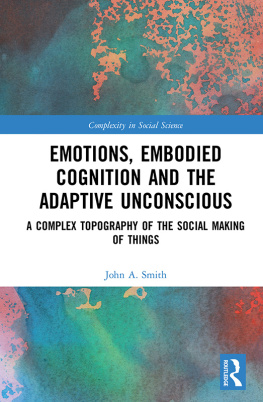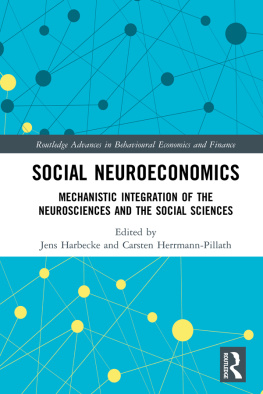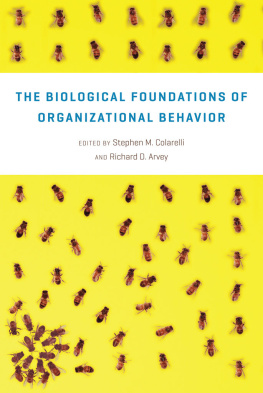BIOSOCIOLOGY AND NEUROSOCIOLOGY
ADVANCES IN GROUP PROCESSES
Series Editors: Shane R. Thye and Edward J. Lawler
Recent Volumes:
Volumes 117: | Edited by Edward J. Lawler |
Volume 18: | Edited by Edward J. Lawler and Shane R. Thye |
Volume 19: | Group Cohesion, Trust and Solidarity Edited by Shane R. Thye and Edward J. Lawler |
Volume 20: | Power and Status Edited by Shane R. Thye and John Skvoretz |
Volume 21: | Theory and Research on Human Emotions Edited by Jonathan H. Turner |
Volume 22: | Social Identification in Groups Edited by Shane R. Thye and Edward J. Lawler |
Volume 23: | Social Psychology of the Workplace Edited by Shane R. Thye and Edward J. Lawler |
Volume 24: | Social Psychology of Gender Edited by Shelley J. Correll |
Volume 25: | Justice Edited by Karen A. Hegtvedt and Jody Clay-Warner |
Volume 26: | Altruism and Prosocial Behavior in Groups Edited by Shane R. Thye and Edward J. Lawler |
Volume 27: | Edited by Shane R. Thye and Edward J. Lawler |
Volume 28: | Edited by Shane R. Thye and Edward J. Lawler |
ADVANCES IN GROUP PROCESSES VOLUME 29
BIOSOCIOLOGY AND NEUROSOCIOLOGY
EDITED BY
WILL KALKHOFF
Department of Sociology,
Kent State University, USA
SHANE R. THYE
Department of Sociology,
University of South Carolina, USA
EDWARD J. LAWLER
School of Industrial and Labor Relations,
and Department of Sociology,
Cornell University, USA

United Kingdom North America Japan India Malaysia China
Emerald Group Publishing Limited
Howard House, Wagon Lane, Bingley BD16 1WA, UK
First edition 2012
Copyright 2012 Emerald Group Publishing Limited
Reprints and permission service
Contact: permissions@emeraldinsight.com
No part of this book may be reproduced, stored in a retrieval system, transmitted in any form or by any means electronic, mechanical, photocopying, recording or otherwise without either the prior written permission of the publisher or a licence permitting restricted copying issued in the UK by The Copyright Licensing Agency and in the USA by The Copyright Clearance Center. Any opinions expressed in the chapters are those of the authors. Whilst Emerald makes every effort to ensure the quality and accuracy of its content, Emerald makes no representation implied or otherwise, as to the chapters suitability and application and disclaims any warranties, express or implied, to their use.
British Library Cataloguing in Publication Data
A catalogue record for this book is available from the British Library
ISBN: 978-1-78190-256-1
ISSN: 0882-6145 (Series)


CONTENTS
Jonathan H. Turner and Alexandra Maryanski
Richard Machalek and Michael W. Martin
David D. Franks and Jeff Davis
Jessica A. Leveto and Will Kalkhoff
Ronald L. Simons, Steven R.H. Beach and Ashley B. Barr
Rengin Firat and Steven Hitlin
Nicole H.W. Civettini
Dawn T. Robinson, Jody Clay-Warner, Christopher D. Moore, Tiffani Everett, Alexander Watts, Traci N. Tucker and Chi Thai
LIST OF CONTRIBUTORS
Ashley B. Barr | Department of Sociology, University of Georgia, Athens, GA, USA |
Steven R. H. Beach | Department of Psychology, University of Georgia, Athens, GA, USA |
Nicole H. W. Civettini | Department of Sociology, Winona State University, Winona, MN, USA |
Jody Clay-Warner | Department of Sociology, University of Georgia, Athens, GA, USA |
Jeff Davis | Department of Sociology, California State University, Long Beach, CA, USA |
Tiffani Everett | Department of Behavioral Sciences, Arkansas Tech University, Russellville, AK, USA |
Rengin Firat | Department of Sociology, University of Iowa, Iowa City, IA, USA |
David D. Franks | Department of Sociology, Virginia Commonwealth University, Richmond, VA, USA |
Steven Hitlin | Department of Sociology, University of Iowa, Iowa City, IA, USA |
Will Kalkhoff | Department of Sociology, Kent State University, Kent, OH, USA |
Jessica A. Leveto | Department of Sociology, Kent State University at Ashtabula, Ashtabula, OH, USA |
Richard Machalek | Department of Sociology, University of Wyoming, Laramie, WY, USA |
Michael W. Martin | Department of Sociology, Adams State University, Alamosa, CO, USA |
Alexandra Maryanski | Department of Sociology, University of California, Riverside, CA, USA |
Christopher D. Moore | Department of Social Sciences, Lakeland College, Sheboygan, WI, USA |
Dawn T. Robinson | Department of Sociology, University of Georgia, Athens, GA, USA |
Ronald L. Simons | Department of Sociology, University of Georgia, Athens, GA, USA |
Chi Thai | Driftmier Engineering Center, University of Georgia, Athens, GA, USA |
Traci N. Tucker | Department of Sociology, Stanford University, Stanford, CA, USA |
Jonathan H. Turner | Department of Sociology, University of California, Riverside, CA, USA |
Alexander Watts | Department of Sociology, Stanford University, Stanford, CA, USA |
PREFACE
Advances in Group Processes publishes theoretical analyses, reviews, and theory-based empirical chapters on group phenomena. The series adopts a broad conception of group processes. This includes work on groups ranging from the very small to the very large and on classic and contemporary topics such as status, power, trust, justice, influence, decision making, intergroup relations, and social networks. Previous contributors have included scholars from diverse fields including sociology, psychology, political science, business, philosophy, mathematics, and organizational behavior.
A short anecdote will help communicate the rationale for this special volume on biosociological and neurosociological approaches. When one of us was slated to teach a new graduate seminar focusing on puzzles in social psychology and neuroscience, and when the course schedule finally came out and word began to spread, it was as if the proverbial unwanted party guest had arrived. Questions of concern began to circulate very quickly: What will be taught in this course? Is this really a good idea? Why are we offering this? Do we really want to head in this direction? And at the first department mixer of the semester, the sparks really started to fly. All throughout the evening, there was always at least one clamorous debate taking place about the advantages versus the pitfalls of joining sociology with the biological sciences. For some the marriage of the two no doubt promises better, fuller explanations of human social behavior and organization. For critics the union often means biological reductionism, genetic determinism, and the potential for oppression (or worse), and a sociologist should know better than to teach such perilous nonsense.














